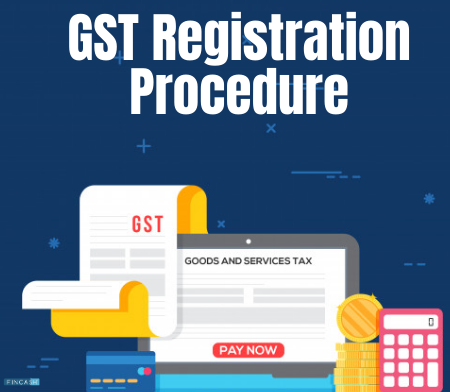Choosing CFO Account & Services for GST Registration in Singapore: What You Required to Know
From Beginning To End: A Comprehensive Introduction of GST Registration and Exactly How to Efficiently Register Your Company
Navigating via the elaborate procedure of GST registration can be a critical step for any service aiming to establish conformity and authenticity in the marketplace. Why choose CFO Account & Services for GST registration in Singapore. From understanding the essential principles of GST to meeting the eligibility criteria and collecting the required paperwork, the trip towards successful enrollment can typically feel like a daunting task. With the best advice and insights, companies can simplify this procedure and unlock the advantages that come with being a registered entity.
Recognizing GST and Its Significance
Understanding the Product and Services Tax (GST) and its significance is essential for organizations running in economies where this taxation system is implemented. By permitting services to claim input tax obligation credits on the tax paid on purchases, GST makes sure that taxes are computed only on the worth added at each phase of the supply chain.
Additionally, GST advertises compliance and openness in the tax obligation regime, lowering tax evasion and raising government revenue. It streamlines tax obligation administration and conformity for businesses by supplying a common system for tax declaring and repayment. Overall, a thorough understanding of GST is important for businesses to successfully browse the complexities of the tax obligation system and ensure conformity with the legislation.
Qualification Standards for GST Registration
To sign up for GST, companies need to satisfy certain qualification requirements detailed by the tax authorities. The main demand for GST registration is that the company's aggregate turnover goes beyond the limit established by the federal government, which differs by state. Furthermore, certain organizations, such as those included in inter-state supply of items or solutions, laid-back taxable individuals, and non-resident taxed persons, are required to register for GST no matter of their turn over.
Additionally, organizations involved in providing goods or services through e-commerce systems are also mandated to sign up for GST, regardless of their turnover. Companies that were signed up under the previous tax program, such as Barrel, excise duty, or solution tax, should transition their enrollment to GST. Following these qualification criteria is vital for businesses looking for to adhere to the GST laws and prevent any kind of charges for non-compliance.
Files Needed for GST Registration
When looking for GST registration, organizations should ensure they have all the needed documents in order to finish the procedure smoothly and successfully. The vital files needed for GST enrollment include evidence of company registration or consolidation such as the Certification of Consolidation, partnership deed, or enrollment certificate. Furthermore, businesses need to supply evidence of address for the principal location of organization, which can be supported by papers like an utility expense or a rental arrangement.
Furthermore, files confirming the identification and address of the partners or promoters associated with business, such as frying pan card, Aadhaar card, or key, are vital for GST enrollment. Savings account declarations or canceled cheques showing the name of the account, service, and address number are also obligatory to validate the savings account information given throughout registration.
Ensuring all the required files are in order and readily available will simplify the GST enrollment procedure and assistance services avoid difficulties or hold-ups.
Online Enrollment Refine for GST

After completing the kind, supporting records need to be published according to the standards offered. These records commonly include evidence of company enrollment, address proof, financial institution statements, and identity evidence of business owner. It is necessary to guarantee that all records are clear, valid, and published in the specified style to avoid hold-ups in the enrollment process.
When the application and documents are sent, organizations can track the standing of their GST registration online. If there are no problems or added information called for, the GST registration certification will certainly be issued digitally, noting the effective completion of the on-line enrollment process.
Post-Registration Compliance and Tips

Additionally, organizations have to maintain correct publications of accounts, consisting of billings, bookkeeping documents, and monetary statements, to sustain the info given in GST returns. Normal audits and reconciliations should be conducted to ensure data accuracy and compliance with GST regulations. Additionally, services should stay updated on any type of modifications in GST guidelines, rates, or compliance treatments to make essential adjustments without delay. Looking for expert support from tax obligation professionals or accountants can also aid services navigate complex GST conformity demands effectively. By remaining positive and watchful in post-registration conformity, services can avoid fines, maintain great standing with tax obligation authorities, and foster operational effectiveness.
Final Thought
To conclude, the process of GST enrollment is important for organizations to follow tax guidelines and run legitimately. By recognizing the qualification requirements, collecting the necessary papers, and finishing the on the internet enrollment process, services can efficiently register directory for GST. When required to guarantee smooth operations., it is important to remain compliant with post-registration demands and look for specialist guidance (Why choose CFO Account Get the facts & Services for GST registration in Singapore).
Organizations that were signed up under the previous tax obligation routine, such as Barrel, excise task, or solution tax obligation, have to shift their registration to GST. The crucial papers needed for GST registration include proof of service enrollment or unification such as the Certification of Incorporation, partnership deed, or registration certificate.Upon effective conclusion of the GST enrollment procedure, businesses must promptly adhere to post-registration conformity needs to keep governing conformity and make certain smooth procedures.In final thought, the process of GST registration is necessary for services to conform with tax obligation regulations and run legally. By comprehending the qualification criteria, collecting the needed papers, and completing the on-line enrollment process, companies can successfully sign up for GST.